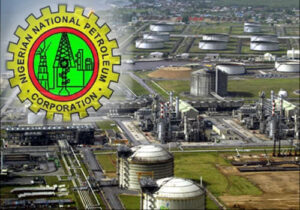NNPC Struggles with Fuel Shortages Amid Surge in Black Market Prices
NNPC Struggles with Fuel Shortages Amid Surge in Black Market Prices

NNPC
The Nigerian National Petroleum Company (NNPC) has pledged to resolve the current petrol queues by Wednesday, but the black market for fuel has surged in response to ongoing shortages.
Despite NNPC’s assurances, which include claims that it does not owe $6.8 billion to international oil traders as previously reported, the fuel supply situation remains critical. Industry insiders suggest this debt claim has contributed to the widespread scarcity of Premium Motor Spirit (PMS) in Nigeria.
While NNPC insists that the queues will clear by mid-week, oil marketers report no improvement in product loading at depots. Black market sellers have capitalized on the situation, with petrol prices reaching between N1,200 and N1,500 per litre.
NNPC attributes the scarcity to challenges in evacuating fuel from PMS vessels. As Nigeria’s sole importer of petrol, NNPC faces difficulties as other dealers have stopped importing due to issues accessing U.S. dollars for purchases.
Olufemi Soneye, Chief Corporate Communications Officer of NNPC, reassured that efforts are underway to address the supply issues and alleviate the fuel shortages. “The problem is mainly related to evacuation from Apapa ports, but we are working to resolve it and expect the situation to improve by Wednesday,” Soneye stated.
Despite these assurances, reports indicate that the supply situation at depots has not yet improved. One official from a major petroleum company noted a complete lack of stock, and some experts predict that shortages may worsen in Lagos during the week.
A filling station manager in Abeokuta revealed that petrol prices had risen to N880 per litre by Friday, and private depots are inflating prices further. Similarly, Chief Ukadike Chinedu from the Independent Petroleum Marketers Association of Nigeria highlighted the impact of recent nationwide protests on the sector’s supply chain.
In a related development, NNPC has denied allegations of owing $6.8 billion to international traders and claims of not remitting funds into the federation account since January. Soneye clarified that NNPC does not owe this amount and that the company regularly remits taxes to the Federal Inland Revenue Service.
Despite these clarifications, the fuel scarcity persists, with petrol prices exceeding N1,000 per litre in some regions. Queues for fuel remain long in several states and Abuja, while black market prices continue to soar. Residents in states like Osun, Edo, and Uyo are particularly affected, with prices reaching as high as N950 per litre in Uyo and N980 per litre in Benue.
Overall, the fuel shortage continues to impact various regions, causing significant hardship for motorists and commuters across Nigeria.
TRENDING SONGS
 Shock in Anambra: Bride Disappears Moments Before Wedding
Shock in Anambra: Bride Disappears Moments Before Wedding
 Nigerian Woman Returns ₦330 Million Accidentally Credited to Her Account
Nigerian Woman Returns ₦330 Million Accidentally Credited to Her Account
 APC Don Reach Morocco?’ VeryDarkMan Reacts to Seyi Tinubu Poster
APC Don Reach Morocco?’ VeryDarkMan Reacts to Seyi Tinubu Poster
 Bride Breaks Down in Tears as Wedding Meals Were Kept Secretly While Guests Go Home Hungry
Bride Breaks Down in Tears as Wedding Meals Were Kept Secretly While Guests Go Home Hungry
 Odogwu by Day, Robber by Night: How Marriage Joy Turned Into Tragedy
Odogwu by Day, Robber by Night: How Marriage Joy Turned Into Tragedy
 Nigerian Officials Allegedly Pocket N4–6B Weekly Through Smuggling Cartels at Seme–Badagry Border
Nigerian Officials Allegedly Pocket N4–6B Weekly Through Smuggling Cartels at Seme–Badagry Border
 Ahmad Yerima: Naval Officer to Face No Sanctions After Clash with Wike – Matawalle
Ahmad Yerima: Naval Officer to Face No Sanctions After Clash with Wike – Matawalle
 Trending Video: Muslim Man Joins Wife in Hallelujah Challenge ‘Dress Like Your Miracle’ Night
Trending Video: Muslim Man Joins Wife in Hallelujah Challenge ‘Dress Like Your Miracle’ Night
 Woman Seeks Advice as Late Brother’s Wife Refuses to Mourn Him Following His Death With Alleged Mistress
Woman Seeks Advice as Late Brother’s Wife Refuses to Mourn Him Following His Death With Alleged Mistress
 Nobody Cares About Fine Girls In The UK, I Miss Nigeria — Nigerian Lady Laments
Nobody Cares About Fine Girls In The UK, I Miss Nigeria — Nigerian Lady Laments
Share this post with your friends on ![]()













